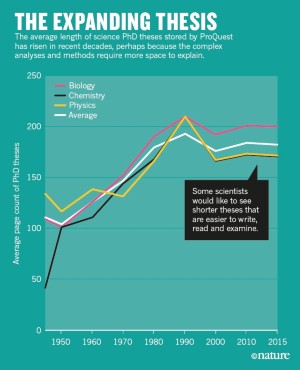Doctoral courses are slowly being modernized. Now the thesis and viva need to catch up.

On the morning of Tom Marshall's PhD defence, he put on the suit he had bought for the occasion and climbed onto the stage in front of a 50-strong audience, including his parents and 6 examiners. He gave a 15-minute-long presentation, then faced an hour of cross-examination about his past 5 years of neuroscience research at the Donders Institute for Brain, Cognition and Behaviour in Nijmegen, the Netherlands. A lot was at stake: this oral examination would determine whether he passed or failed. “At the one-hour mark someone came in, banged a stick on the floor and said 'hora est',” says Marshall — the ceremonial call that his time was up. “But I couldn't. I had enjoyed the whole experience far too much, and ended up talking for a few extra minutes.”
Marshall's elaborate, public PhD assessment is very different from that faced by Kelsie Long, an Earth-sciences PhD candidate at the Australian National University (ANU) in Canberra. Her PhD will be assessed solely on her written thesis, which will be mailed off to examiners and returned with comments. She will do a public presentation of her work later this year, but it won't affect her final result. “It almost feels like a rite of passage,” she says.
PhDs are assessed in very different ways around the world. Almost all involve a written thesis, but those come in many forms. In the United Kingdom, they are usually monographs, long explanations of a student's work; in Scandinavia, science students typically top-and-tail a series of their publications. The accompanying oral examination — also called a viva voce or defence — can be a public lecture, a private discussion or not happen at all. There is wide variation across disciplines and from one institution to the next. “It is a complicated world in doctoral education. One format does not fit all,” says Maresi Nerad, founding director of the Center for Innovation and Research in Graduate Education at the University of Washington in Seattle.
This isn't necessarily a problem in itself, but some researchers worry that the decades-old doctoral assessment system is showing strain. Time-pressured examiners sometimes lack training and preparation for PhD assessments, which can lead to lack of rigour. “Two or three examiners come together to go through the thesis in a perfunctory way. They tick the boxes, everyone is happy, and then a PhD walks away,” says Jeremy Farrar, director of the biomedical research charity the Wellcome Trust in London.
Farrar, like other scientists, suspects that the PhD assessment is not keeping up with the times. Single-author tomes seem outdated when much of research has become a multidisciplinary, team endeavour. Research is becoming more open, but PhD assessments can lack transparency: vivas are sometimes held behind closed doors. Some PhD theses languish, little-used, on office shelves or in archives. “We're seeing some students who are still submitting paper theses to us — they don't have electronic theses yet,” says Austin McLean, director of scholarly communication and dissertation publishing at ProQuest in Ann Arbor, Michigan, which has the largest database of PhD theses in the world. What's more, little attention is given in the PhD assessment to soft skills such as management, entrepreneurship and teamwork, even though these are an essential part of life beyond the PhD, and students are increasingly leading that life outside academia. “The assessment of the PhD hasn't been updated to fit the modern definition of a PhD,” Farrar says.
“There are a lot of pressures to make changes to the thesis,” says Suzanne Ortega, president of the Council of Graduate Schools in Washington DC, one of a number of groups discussing the issue. The council organized a workshop in January this year called Future of the PhD Dissertation, and in March, the Australian Council of Learned Academies (ACOLA) in Melbourne examined changes to the thesis as part of a review on researcher training. Some scientists and education experts welcome the attention. “I don't think the current model for thesis examination is ideal, but there are positive movements towards changing it,” says Inger Mewburn, director of research training at ANU and editor of the blog The Thesis Whisperer, which is dedicated to those completing a thesis.
Passing the test
Academics agree about one thing regarding the PhD assessment — its aim. The traditional goal is to demonstrate the candidate's ability to conduct independent research on a novel concept and to communicate the results in an accessible way. Where the academics differ is on how best to achieve that goal.
Shirley Tilghman, a molecular biologist and former president of Princeton University in New Jersey, sees merit in the monograph form of the thesis. It demonstrates scholarly ability by requiring students to “frame the historical context of a problem, describe in detail the purpose and execution and then come to a credible conclusion”, she says.
But should the thesis include academic publications, too? That's the norm at the Karolinska Institute in Stockholm, Sweden, where most theses are a compilation of the student's original papers, along with a relatively short discussion, perhaps 50 pages long. The rationale is that publishing should be part of training because it better equips students for academic life and securing jobs.
Some students who complete a monograph end up wishing that they had spent more time on writing papers. James Lewis successfully defended his physics PhD at Imperial College London in October 2015, but he thinks that his one published paper landed him his postdoc at NASA's Goddard Space Flight Center in Greenbelt, Maryland. “The job market for postdoc positions is very competitive,” he says, “so if you can get a paper published during your PhD then you're helping yourself.” While he waits to start, Lewis is spending his days writing papers based on his research. “I'm wondering: would it not have been better to write these instead of the thesis, which took me five months to write?”

But others argue that the pressure to publish could rob PhD students of valuable parts of their studies, such as the time to shape their research path and to think creatively and independently. “The PhD might become driven by papers only,” says Farrar. “Students might end up spending their time focusing only on what papers they can produce, then staple them together with a summary and they're done — adding to the sense that the whole scientific enterprise is a paper factory rather than an exploration.”
Long is working at ANU towards a thesis-by-publication: she's written and submitted one paper and has started on a second. But she's struggling. “I am finding this one much harder to write, mostly because it isn't as new or exciting as the previous one,” she says. What's more, her strategy depends on things at least partly outside her control — on her PhD generating enough complete studies for publication and on a reasonably timely peer-review process.
Completed PhD theses are typically stored in university libraries — but that doesn't mean that they are read or used. Some 60% of submissions to the ProQuest database fall under the category of science, technology or mathematics, but they are the ones that are accessed least. “We think this is because the communication is more journal-focused,” says McLean. Scientists do tend to keep a copy of their theses in their office or lab for use by students and colleagues. Neil Curson, a physicist at the London Centre for Nanotechnology, says that his PhD, written more than 20 years ago, is still consulted by his students when they come into his lab. Many theses, however, end up collecting dust.
Viva la viva
Whatever form the thesis takes, it has to be assessed — in most countries, by a panel of experts, and often involving an oral exam. But the viva “doesn't have the same level of consistency as the written form of examination”, says Allyson Holbrook, an education researcher at Australia's University of Newcastle. In Israel, the viva is optional and very few students choose to have one; in the Netherlands, it is formal and ceremonial; in the United Kingdom, it's typically a private affair with two or three examiners; and in Australia, it's hardly performed at all. “One hundred per cent of the doctoral examination is about the thesis here,” says Holbrook. That's largely because, historically, there weren't enough experts in the country to examine the work in person and it was costly to fly them in, she says.
Holbrook and her research team published a study last year that compared the assessment methods used in Australia with those in New Zealand and the United Kingdom (T. Lovat et al. Higher Ed. Rev. 47, 5–23; 2015). They concluded that doing an oral defence rarely changed the result, and that the thesis itself was the “determinative step” of passing. The review on Australian research training published in March didn't support adding a viva either, but it did recommend a move towards more continuous assessment of a student, rather than waiting until the end of the training.
Some researchers see problems with the viva. It's not uncommon for nerves to get the better of a student, and for them to freeze in front of their audience, however small it is. Examiners could worsen the situation by asking very difficult questions, says David Bogle, a chemical engineer at University College London. “There are cases where undue pressure is placed on the candidate by the examiners. This shouldn't be allowed.”
Trial by error
Most researchers don't support a global standard for the PhD assessment. A one-size-fits-all approach would be impossible to implement, they say, and the type of assessment — be it continuous appraisal, written thesis or oral exam — should depend on discipline, project, student, supervisor and institution. “If you take away the variability in assessment and form of the thesis then you lose all creativity and innovation from the PhD,” Nerad says.
But many feel that the system could be improved — by making the thesis shorter, for one. Data from ProQuest, which stores 4 million theses, show that the average length of biology, chemistry and physics PhDs soared to nearly 200 pages between 1945 and 1990. That could be because students are analysing more complex questions, performing longer literature reviews and using increasingly complicated methods that require lengthier explanations (see 'The expanding thesis'). “It's unnecessary to have such a long thesis,” says Farrar, who recently assessed one such tome. “'The thicker my PhD, the better' has become a myth in the PhD community, and is taking it down the wrong direction.”
'The thicker my PhD, the better' has become a myth in the PhD community.
Farrar says that a slimmed-down document would be more appropriate. That could follow the concise format of a research paper, and include a review of the field, then short chapters on methods, analysis and discussion. “It would be more succinct and focused. And the examiners will probably read it all.”
That isn't necessarily the case now. Examiners have to find time to review theses in between research, teaching, grant-writing and many other demands. “Something has to give, and what gives is the amount of time spent on any of those individual tasks,” says Farrar. That means an examiner might skim through years of a PhD student's work in just a couple of hours. “I think we owe it to the students to examine them properly and help prepare them for their future careers,” he says.
The modern thesis
One way to better reflect the team-based nature of science would be to write a joint thesis, an approach that has been used in arts and humanities graduate education in the past. However, this can make it difficult to assign credit. “If you have worked on a collaborative dissertation, a potential employer might struggle to see whether you really are an independent thinker or could you read a lead a research project,” says Ortega.
There is another matter to wrestle with — the fact that half of science PhD graduates in the United States are choosing careers outside of academia, according to the National Science Foundation's 2014 Survey of Earned Doctorates. “Under those conditions, the standard assessment should include the skills in what they'll need when going on to future careers,” says Michael Teitelbaum, labour economist at Harvard Law School.
Increasingly, institutions offer courses to PhD students in skills such as teamwork, management and research ethics, but these skills aren't usually assessed formally. The viva would be one opportunity to do so, perhaps by seeing how students react to various scenarios. Alternatively, as the ACOLA review suggested, PhD candidates could accrue credits in transferable skills through professional-development activities that are recorded in a portfolio. “You can't just assume that if you throw them into an environment they will meaningfully learn from that environment,” says psychologist Michael Mumford, a director of the Center for Applied Social Research at the University of Oklahoma in Norman. “We need exams that ask students to deal with both real-world problems as well as ambiguous academic problems.”
Farrar thinks that a change in emphasis could help. Rather than thinking of the thesis and viva as an exam, it should be viewed as the culmination of a long project. “You need to look at the PhD in the context of those four years of research, not just as revision for one big test.”
Mewburn stresses that whatever form the assessment takes, it should focus more on the individual than on their work. “My preference is to assess the researcher,” she says, “but we haven't developed the tools and curriculum to do that.”
Few failures
It's difficult to find figures on how many students fail their PhD if they get to the point of submitting a thesis but, anecdotally, scientists say that few flunk it outright. More often, students are sent away with minor or major corrections that have to be completed before the PhD is awarded.
There are theories that few students fail because universities want to keep their number of graduates high for the rankings. But most researchers dispute this, and point to other reasons. One is that weak students are likely to have dropped out before they reach the final assessment. Furthermore, supervisors and the supporting institutions typically work hard — through regular reviews and assessments — to make sure that a candidate and project are of a sufficient standard before the thesis is submitted. “You haven't done your due diligence as a university if a student is getting to a stage where they are sending out theses that are going to fail,” says Simon Hay, a global-health researcher at the University of Washington.
Nerad sees no need to reform the final PhD assessment. For her, the problem lies with the variability of graduate education as a whole. “Now that research is becoming more globalized, the PhD needs to be too.” That process is under way, Nerad says: the pressures of economic globalization, international policies and national drives to house world-class universities have led to a more standardized PhD experience across the world.
During her tenure as Princeton's president, Tilghman was often asked if there was a perfect way to assess a PhD course. Not many liked her answer — that she could only really evaluate a student at the 25-year reunion. “In the end, the only way you can assess it is whether the graduates of the programme become successful scientists. If they do, you've done a good job. If they haven't, you haven't.”
Author information
Authors and Affiliations
Related links
Related links
Related links in Nature Research
Back to the thesis 2016-Jul-06
The past, present and future of the PhD thesis 2016-Jul-06
The future of the postdoc 2015-Apr-07
How not to deal with the PhD glut 2014-Oct-22
Education: The PhD factory 2011-Apr-20
Seven ages of the PhD 2011-Apr-20
Nature special: Future of the PhD
Related external links
ProQuest Dissertations and Theses
Centre for Innovation & Research in Graduate Education
Australian Council of Learned Academies: Review of Australia's Research Training System
Rights and permissions
About this article
Cite this article
Gould, J. What’s the point of the PhD thesis?. Nature 535, 26–28 (2016). https://doi.org/10.1038/535026a
Published:
Issue Date:
DOI: https://doi.org/10.1038/535026a
This article is cited by
-
Research Ethics in the Assessment of PhD Theses: Footprint or Footnote?
Journal of Academic Ethics (2017)
-
Being more open about PhD papers
Nature (2016)
-
Gap widens for honorary PhDs
Nature (2016)








